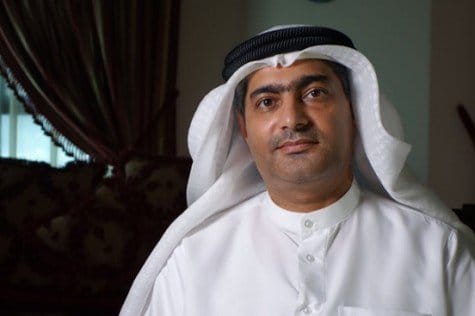The UAE should immediately release Ahmed Mansoor, an award-winning human rights activist, and vacate the 10-year prison sentence issued against him for crimes that appear to violate his right to free expression.
Authorities arrested Mansoor, who won the prestigious Martin Ennals Award in 2015 and is a member of Human Rights Watch’s Middle East advisory committee, on March 20, 2017. He was held in an unknown location for more than a year with no access to a lawyer and only very limited family visits and was sentenced on May 29, 2018.
“The UAE has exposed itself as a brutally repressive place more interested in sending rights defenders to rot in jail than in any real reform,” Sarah Leah Whitson, Middle East director at Human Rights Watch said. “So long as Mansoor remains in prison, no amount of money nor army of public relations firms will be able to wash away this stain on the UAE’s reputation.”
Until his arrest in 2017, Mansoor had been one of the last remaining public human rights defenders in the UAE able to criticize the authorities publicly. United Nations human rights experts have echoed the calls to free Mansoor, describing his arrest as “a direct attack on the legitimate work of human rights defenders in the UAE.”
On May 30, the UAE-based newspaper The National reported that a court had sentenced Ahmed Mansoor to 10 years in prison, a fine of 1,000,000 UAE Dirhams (US$272,000), three years of probation after completion of his sentence, and confiscation of his electronic devices. The court convicted Mansoor for insulting the “status and prestige of the UAE and its symbols,” including its leaders, and seeking to damage the UAE’s relationship with its neighbors by publishing false reports and information on social media, the paper reported.
The reporting echoed that of the UAE’s official news agency, WAM, on March 20, after Mansoor’s arrest. WAM reported that authorities had arrested Mansoor on the orders of the Public Prosecution for Cybercrimes for using social media websites to “publish false information and rumors,” “promote [a] sectarian and hate-incited agenda,” and “publish false and misleading information that harm national unity and social harmony and damage the country’s reputation.” That report classified these as “cybercrimes,” indicating that the charges may be based on alleged violations of the UAE’s repressive 2012 cybercrime law, which authorities have used to imprison numerous activists. It provides for long prison sentences and severe financial penalties.
In February 2018, a group of international human rights groups commissioned two lawyers from Ireland to travel to the UAE capital, Abu Dhabi, to seek access to Mansoor during his pretrial detention. UAE authorities gave the lawyers conflicting information about Mansoor’s whereabouts and denied them access to him. According to the Gulf News, Mansoor told the court during his first hearing that he had been unable to retain a lawyer, so the court appointed one for him.
People in the UAE who speak out about human rights abuses are at serious risk of arbitrary detention, imprisonment, and torture, and many are serving long prison terms or have felt compelled to leave the country.
In the weeks leading up to his most recent arrest, Mansoor had criticized the UAE’s prosecutions for speech-related offenses. Mansoor had also used his Twitter account to draw attention to human rights violations across the region, including in Egypt and Yemen. He also signed a joint letter with other activists in the region calling on leaders at the Arab League summit in Jordan in March 2017 to release political prisoners in their countries.
In April 2011, UAE authorities detained Mansoor over his peaceful calls for reform and in November, the Federal Supreme Court in Abu Dhabi sentenced him to three years in prison for insulting the country’s top officials after a trial deemed unfair. Although the UAE president, Sheikh Khalifa bin Zayed Al Nahyan, pardoned Mansoor, authorities never returned his passport, subjecting him to a de facto travel ban. He has also faced physical assaults, death threats, government surveillance, and a sophisticated spyware attack.
In August 2016, the Toronto-based research group Citizen Lab reported that Mansoor received suspicious text messages on his iPhone promising information about detainees tortured in UAE jails and urging him to click on a link. Citizen Lab discovered that clicking on the link would have installed sophisticated spyware on his iPhone that allows an outside operator to control the targeted iPhone’s telephone and camera, monitor chat applications, and track the user’s movements. Similar methods for breaking into iPhones have been valued at US$1 million, leading Citizen Lab to call Mansoor “the million-dollar dissident.”
While Mansoor can appeal his recent conviction, trials in the UAE, including Mansoor’s own in 2018 and in 2011, are often marred by legal and procedural flaws.
Article 32 of the Arab Charter on Human Rights, to which the UAE is a party, guarantees the right to freedom of opinion and expression and to impart news to others by any means. Restrictions are only allowed on the practice of this right to “respect for the rights of others, their reputation, or the protection of national security, public order, public health, or public morals.” Article 13(2) of the charter also requires that judicial hearings be “public other than in exceptional cases where the interests of justice so require in a democratic society which respects freedom and human rights.”
“Mansoor’s sentence is a cruel reminder of the UAE’s relentless determination to quash any semblance of criticism or any conversation about rights,” Whitson said. “The UAE’s supposed allies – including in Washington and London – should stand up for Mansoor and demand that he is freed.”



 العربية
العربية